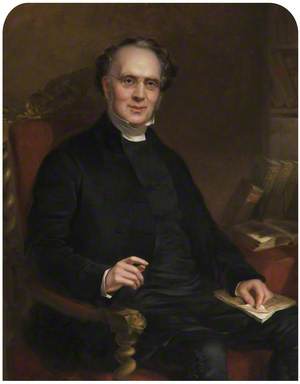Canon Francis Robert Raines

Apart from his grave in Milnrow St James’ Church graveyard and a local road that bears his name, little remains of one of the most important men from the Rochdale area in the 19th century.
Francis Raines was born into a professional family in Whitby on 22nd February 1805. He was the third son of a Hull physician, Isaac Raines MD and Ann, daughter of Joseph Robertson the vicar of Aislaby. His early education was at Burton Pudsea, intending that Francis follow his father into medicine. At the age of 13 in 1818 after his older brother, on grounds of ill health, left his apprenticeship with William Coultate a surgeon in Clitheroe, Francis was sent to take his place. At the time, his father described his son as ‘a fine stout lad’ and although his apprenticeship was supposed to last for 7 years the boy tired of the medical professional and, after undertaking study periods at Clitheroe and Burnley Grammar schools, left medicine to take up a place at St Bees Theological College in what was then Cumberland.
His first ordination at the age of 23, was a short appointment as assistant curate at Saddleworth and then Rochdale where he took a curacy at the Parish Church offered to him by the infamous vicar of Rochdale, the Reverend W R Hay. In 1832 he was appointed – again by Hay on the death of Reverend Joseph Hodgson – as perpetual curate of St James Milnrow where he stayed for the rest of his life. At his ministry in Milnrow he threw himself into rebuilding the church and setting up a school, spending something like £30,000 in the process.
Personal honours came his way during his time at Milnrow. He was appointed as domestic chaplain to the Earl of Dunmore in 1841 and an MA was bestowed upon him by the Archbishop of Canterbury in 1845. He was rural dean of Rochdale from 1846 to 1877 and an honorary canon of Manchester Cathedral from 1849. In 1845 was made Justice of the Peace for the county.
In Milnrow in 1836 Francis Raines married Honora Elizabeth Beswicke the eldest daughter of Major John Beswicke of Pike House Littleborough. They had three children, Susan Ann Robertson who died in infancy, Honora Bella who married George Twycross of Horstead House, near Brighton and Florence Addison.
It is however, as an antiquarian that he is best remembered outside Milnrow. Interested in history and the records of local villages and towns, Raines, even as a young man in Saddleworth, worked with James Butterworth in compiling the history of the local church there and continued to gather biographies and family histories as well as records of villages around Rochdale for many years afterwards. This was well recognised across the region and by 1843 he was not only elected to the Society of Antiquarians but took his place as one of the founder members of the Chetham Society in Manchester where he was elected Vice President in 1858, succeeding Canon Parkinson. His careful and well-ordered records were the fruits of years of painstaking research and constitute the basis of the 17 volumes of the Society’s ‘Remains Historical and Literary connected with the Palatine Counties of Lancaster and Chester,’ the edited 23 volumes of the Chethams Society series as well as 44 volumes of manuscripts – ‘The Lancashire Manuscripts’ – which form the basis of the Raines Collection at Chethams library. He is regarded as the main historical link to the history of Rochdale and its neighbouring towns. Part of his work was to transcribe, in impeccable handwriting, the early documents that had been left to deteriorate over many years concerning Milnrow Church.
On October 17th 1878, at the age of 73 and after a short illness, Francis Raines died in Scarborough. His body was taken to Milnrow and buried in the churchyard there where a memorial was erected ‘by his sorrowing parishioners and friends.’ He had been minister at St James Church for 46 years, a loss not only to the village of Milnrow but also to the world of history and antiquarian studies. Inscribed on his monument is written : ‘This is a man who made a difference and shared what he had of himself with others.’